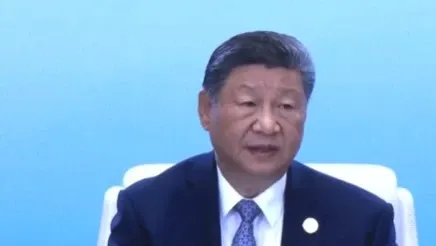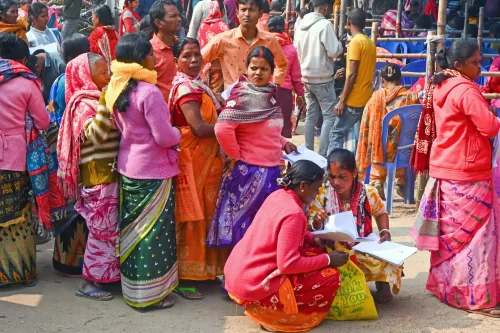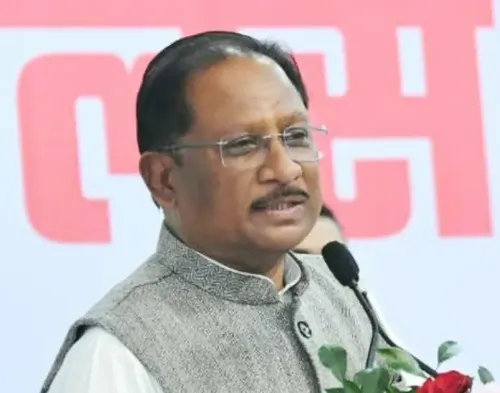What Did Chinese President Xi Jinping Say About 'Cold War Mentality' at the SCO Summit?

Synopsis
Key Takeaways
- Promote a correct understanding of World War II history
- Reject cold war mentality and unilateral actions
- Advocate for a multipolar world
- Enhance cooperation among SCO member states
- Establish mechanisms for efficient decision-making
Tianjin, September 1 (NationPress) Chinese President Xi Jinping on Monday urged the promotion of a correct understanding of World War II history and called for a rejection of cold war mentality, block confrontations, and bullying. This statement is perceived as a direct message to the United States regarding its unilateral tariffs imposed on various nations, including China. He emphasized that the member states of the Shanghai Cooperation Organisation (SCO) should champion an equal, orderly multipolar world and foster inclusive economic globalization.
During his address at the 25th meeting of the Council of Heads of State of the SCO in Tianjin, Xi stated, "We must uphold fairness and justice. We must promote a correct view of World War II history and oppose Cold War mentality, block confrontation, and bullying. We must support the international system centered around the United Nations and uphold the multilateral trading system anchored by the World Trade Organisation. Furthermore, we must advocate for an equal and orderly multipolar world and promote inclusive economic globalization to establish a more just global governance system."
He highlighted the need for member states to continue reforming the SCO, enhance resource input, and build capacity to ensure that its mechanisms are robust, decision-making is scientific, and actions are efficient.
"We must adhere to pragmatism and efficiency. We must further reform the Shanghai Cooperation Organization, enhance resource allocation, and build capacity to ensure its mechanisms are resilient, its decision-making is scientific, and its operations are efficient. We need to expedite the launch of the Integrated Center for Addressing Security Threats and Challenges and the Narcotics Control Center, and establish the Shanghai Cooperation Organization Development Bank promptly to provide stronger support for the security and economic cooperation among member states," he added.
In advocating for finding common ground while also respecting differences, Xi asserted, "We must insist on seeking common ground while reserving differences. Shared aspirations are a source of strength, and seeking common ground while respecting differences reflects broad-mindedness and wisdom. All SCO member states are friends and partners. We must respect each other's differences, maintain strategic communication, forge collective consensus, strengthen unity and cooperation, expand collaborative efforts, leverage each country's strengths, and shoulder the shared responsibility of promoting peace, stability, development, and prosperity in the region."
Xi emphasized that SCO member states should uphold openness and inclusiveness, stressing the importance of learning from one another through cultural exchanges and providing robust support in economic cooperation to cultivate a flourishing civilizational garden characterized by self-improvement, mutual benefit, and harmonious coexistence.
He remarked, "Since its inception 24 years ago, the Shanghai Cooperation Organization has established the Shanghai Spirit based on mutual trust, mutual benefit, equality, consultation, respect for diverse civilizations, and the pursuit of shared development. Over the past 24 years, member states have upheld this original aspiration, shared opportunities, pursued common development, and propelled the SCO's development and cooperation, achieving a series of groundbreaking and historic milestones."
The ongoing SCO Summit in Tianjin is a permanent intergovernmental international organization that was founded in Shanghai on June 15, 2001. Its member states include China, Russia, India, Kazakhstan, Kyrgyzstan, Tajikistan, Pakistan, Uzbekistan, Iran, and Belarus. The SCO also has two observer states—Afghanistan and Mongolia—and 14 dialogue partners: Turkey, Kuwait, Azerbaijan, Armenia, Cambodia, Nepal, Sri Lanka, Saudi Arabia, Egypt, Qatar, Bahrain, The Maldives, Myanmar, and the United Arab Emirates.










